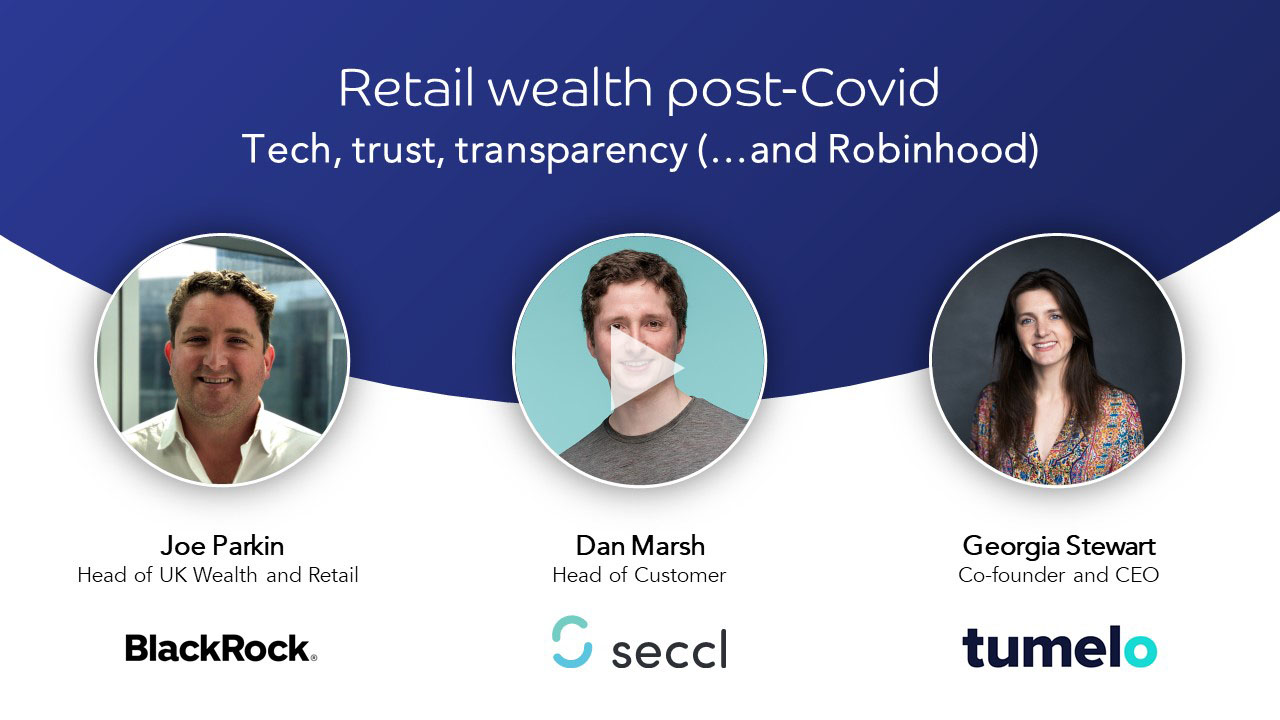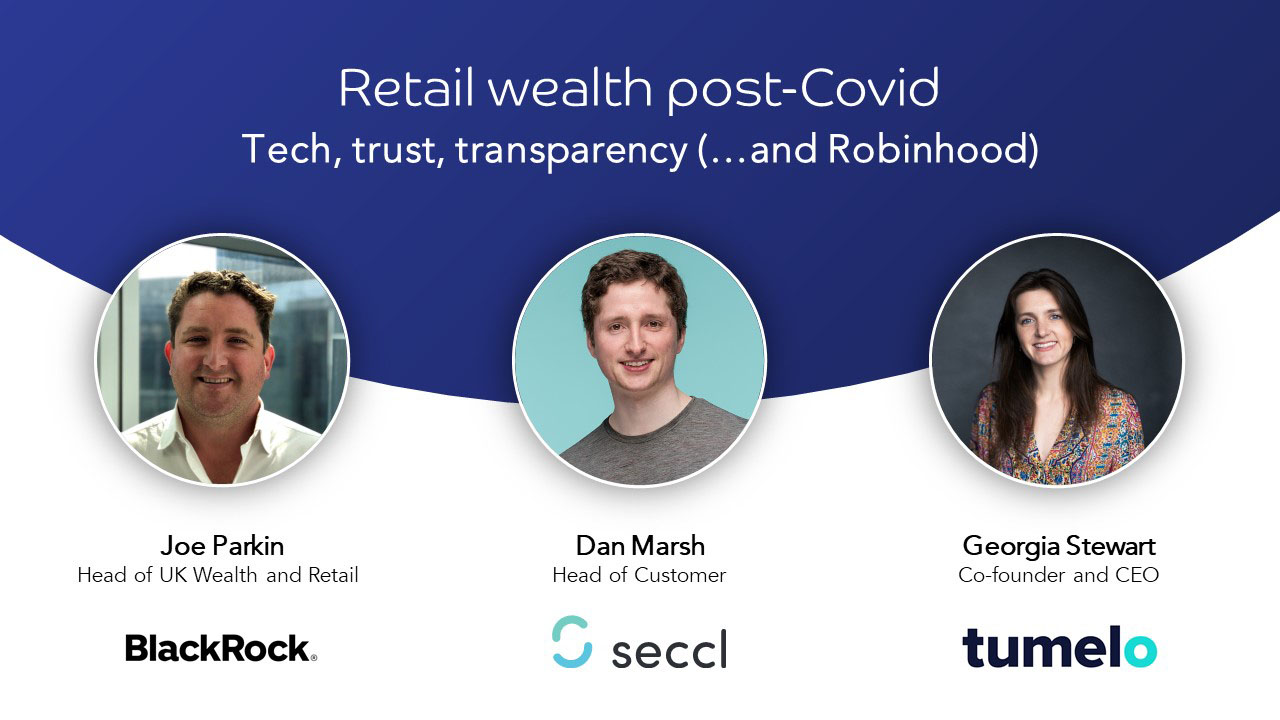I recently hosted a webinar with two guests from the retail wealth industry – Joe Parkin, Head of Banks and Digital Channels in the UK at BlackRock, the world’s largest asset manager, and Georgia Stewart, Co-founder and CEO of Tumelo, a young but fast-growing tech firm that’s helping to engage investors by giving them full transparency into the companies they invest in.
It was always set to be an interesting discussion, but what came out of it were some poignant insights into the core values of both companies, and the future of the industry as a whole. I fully recommend watching the full video, as we cover a lot of ground in a short amount of time – and both Georgia and Joe have a lot of valuable things to say.
You can watch the full talk here
Firstly, a bit of background on our guests. BlackRock is one of the world’s largest asset manager, currently with $9 trillion under management. Speaking with Joe, it was interesting to glean that 18% of their revenue comes from technology – which is a vehicle for their core mission: financial inclusion and wellbeing.
According to Joe, “Wellbeing is crucially about three things: physical, mental and financial health – and improving the latter often helps the other two.” He goes on to say that moving the UK forwards in terms of their financial health is the main objective of BlackRock – and the reason he gets out of bed in the morning. For this, technology is the enabler.
Georgia Stewart co-founded Tumelo when she was at Cambridge University. She and the rest of the Positive Investment Committee discovered that people rarely have a voice at the companies they’re investing in, even though it’s their money.
“This stems from an education problem, but it also leads to an education problem,” Georgia explains. “There is a fundamental lack of awareness around where these investments are going. We need to help break the concepts down, make them less scary and help people engage.”
Moving onto COVID…
COVID has obviously had a huge impact on our industry, as well as how the average person interacts with their money. I asked Joe to summarise what he thought had changed during our year of lockdowns.
“Firstly, it has taken the issue of sustainability from something that is ‘nice to have’ to a non-negotiable. Businesses have been forced to examine how sustainability is a threat, and how it is an opportunity, as well as how to really look after their people.”
“In terms of technology, the industry leapt forward six years in six months during the pandemic. Now, if you’re not able to onboard and connect with customers digitally, you’re never going to make it as a modern wealth manager.”
"Now, if you’re not able to onboard and connect with customers digitally, you’re never going to make it as a modern wealth manager.”
“Finally, the past 12-18 months has given people the opportunity to pause, step back and think about their long-term financial future. During COVID, 1.2 million new investment clients were processed on different platforms across the UK. We need to make sure this continues, and that new investors get the information and engagement they need to focus on the long term.”
“There is also this ‘screw the system’ element that has got young people more engaged in investing and buying individual stocks,’ Georgia added. “Due to the GameStop saga and the gamification of investment apps in general, people now understand more about the process, rather than throwing money into a robo app and not knowing where it ended up.”
We then briefly touched on changing the world. (No biggie.)
According to Joe, “One of the best ways to affect change is to deploy capital to the companies who are doing the right thing and making the right investments. However, this is riddled with challenges and barriers to entry.”
Talking trust/ethics in retail investing…
There’s been a huge increase in activity and share trading during covid, but what about engagement from a retail standpoint? Joe talked a bit about having a “social license to operate,” and why that was so important for BlackRock.
Georgia then remarked on the importance of nuance in this discussion. “Investing in a tobacco company or a fossil fuel company is not necessarily a bad thing. The question is, are you encouraging that company to transition as quickly as your clients would like?”
“Education is important in terms of getting past the nuance. On our platform you can get both sides of the story. It’s not always as simple as the market makes it out to be. Over-simplification of these issues can lead to greenwashing. It also catches companies out when they ask the deeper questions and the nuance isn’t there.”
Next up, GameStop, and the gamification of investing…
I asked Georgia to what extent she believed gamification has reduced the barriers to investment.
“What GameStop did is make people feel powerful,” Georgia said. “And that is really the key to engaging people. Being able to say, you are powerful as an investor in a fund is a difficult story to tell. GameStop was an easy story. It was the people vs the financial system, and the people were winning.”
“What GameStop did is make people feel powerful. And that is really the key to engaging people."
“At the moment, people have 90% of their investments in pensions and long-term ISAs. The other 10% is where they take their risks – this is the ‘fun’ bit, and the part people most engage with. We want them to engage more with the other 90%.”
I wonder if the long-term wealth debate could learn a few lessons from the GameStop/Robinhood saga?
“We need to look at that bar GameStop has set – this is how engaged people can be – here is the potential. People are interested in this stuff, they want to make money, so there’s clearly a massive opportunity there,” she added.
And back to technology…
The wealth management industry was transformed in 2020. Joe talked a bit about the impact of technology on the advisory market and the benefits to the wealth management industry
“There will obviously be winners and losers, here, but those who were able to embrace technology will be the winners, and those who haven’t will really struggle – because it’s the future.”
“Think about every other industry in the world. The underlying product is no different when technology improves. What does change is how it’s delivered. The question – when it comes to TV, movies, financial services, anything – is how to take what you have and make it personalised.”
In the spirit of Joe’s comment, we talked for a moment about how jarring it is to be sitting at home, able to order an Uber or get lunch delivered on my phone, but to log into a wealth management app and go through a long and arduous process just to manage my investments.
At the moment, the bar is set so low that just having an app that works is impressive. In the future, I hope we won’t even have to remark on this technology because it will be so seamless.
Looking to the future…
I asked both Georgia and Joe – if they had a crystal ball that could see 5 years in the future, what would the industry look like? I won’t ruin the surprise, because their responses were super interesting and insightful. Needless to say, it’s well worth watching the full talk to get their take on the future of finance.
There’s some really interesting stuff happening in the market at the moment, and both Joe and Georgia are leading the charges.
So what does the future hold for retail wealth in 2021 and beyond? As we emerge tentatively from the pandemic, which trends are here to stay, and which are under threat? Find out for yourself by watching the video here – and be part of the discussion.



